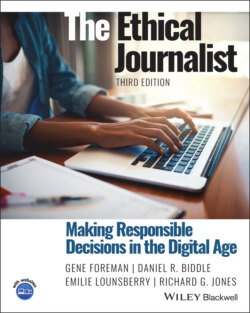Читать книгу The Ethical Journalist - Gene Foreman - Страница 22
The Goal: Ethical Decision-Making
ОглавлениеIn this text and in the ethics course you are studying, you will continue your preparation for a journalism career by examining how good journalists make responsible decisions. The text will identify and discuss the principles of applied ethics that are a foundation for sound decision‐making. As the course progresses, you will practice your decision‐making skill in case studies. The goal is to encourage you to think critically and in concrete terms about the situation confronting you – to employ logic rather than respond reflexively.
You should know that there are capable, intelligent journalists who reject the idea that journalism ethics can be taught in a college course. They argue that journalists, and journalism students, either are honorable, or they are not. If they are honorable, this hypothesis continues, they will automatically make the right decision and so do not need this course. If they are not honorable, no college course is going to straighten them out. As an esteemed editor remarked to a college audience, “If your mom didn’t teach you right from wrong, your college teacher is not going to be able to.”
Although there is truth to that statement, it misses the point. The authors of this textbook assume that you did learn honesty and propriety in your early, formative years. In fact, this course is intended to build on your own sense of right and wrong and to show how to apply that sense to solving ethics problems in the profession.
Sometimes journalists have conflicts in values that their fellow citizens do not. For example, your mom would instruct you to always go to the aid of someone in need. However, journalists might have to weigh intervention to help one person against their duty to inform the public about thousands of other people in the same sort of adversity. If they intervene, they destroy the story’s authenticity – and they fail to inform the public.
Another flaw in the critics’ argument is the presumption that honorable journalists will reflexively do the right thing. Your mom may not have taught you a decision‐making procedure. As you will discover, “the right thing” is not always obvious. You will see that sound decision‐making goes beyond instinct and carefully considers – in a process called critical thinking – the pros and cons of various courses of action.
